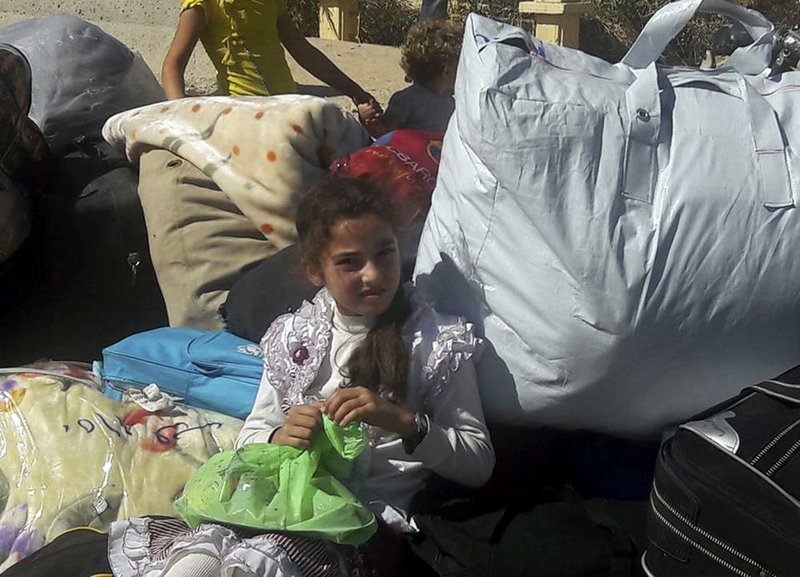BEIRUT -- Hundreds of residents on Wednesday left a formerly rebel-controlled suburb of the Syrian capital, Damascus, as government and Russian forces elsewhere prepared to open corridors out of the contested city of Aleppo in the hopes of facilitating an exodus from its rebel-held quarters.
Aleppo's besieged eastern quarters experienced relative peace for the second-consecutive day in the run-up to the hoped-for evacuation today, after weeks of bombardment left ruins. Russia's military has promised that two corridors will be opened for rebels to flee to the neighboring rebel-held province of Idlib, between 8 a.m. and 7 p.m., three hours longer than had been announced originally. Other corridors will allow civilians to move to government-held areas.
The government's overture to rebels and civilians trapped in Aleppo's east follows a pattern of evacuations around the country that the United Nations has likened to "forced displacement." On Wednesday, some 2,000 residents of the once-autonomous Moadamiyeh suburb of Damascus were taken by government buses to Idlib as part of an arrangement to restore government control after three years of siege at the hands of the military.
Hassan Ghandour, a former Moadamiyeh resident who liaised between the suburb and besieging forces, said Wednesday that the evacuees included 700 gunmen. He said the government is to release all detainees from the suburb in exchange for the evacuation.
Several activists also left with the convoy. Wassim al-Ahmad said it would be "impossible" to live again under government authority, adding he didn't trust official promises for amnesty.
Some of those remaining in Moadamiyeh struck a defiant tone.
"I'm not going to settle anything with the government," said resident Mahmoud, who declined to give his family name out of safety concerns. "I'm going to stay in my home."
"I've spent five years of my life besieged here. I've been through war, siege, starvation ... bombardment and poison gas -- I've survived with all this so I can stay here."
The suburb and two other areas around the capital were gassed with sarin poison in 2013, according to a U.N. investigation. A Human Rights Watch report concluded the government was the most likely culprit.
About 28,000 people remain in Moadamiyeh, down from a prewar population of 105,000, according to the government.
In Aleppo, government buses lined up at checkpoints leading to the besieged east in preparation to take evacuees to Idlib today, according to the media arm of the Lebanese militant group Hezbollah, which is fighting alongside the government in Syria.
The government's Foreign Ministry said soldiers were withdrawing from the designated corridors to reassure evacuees.
It is unclear how many people will take the government's offer after weeks of siege and bombardment pulverized the east and shattered its medical network.
The Britain-based Syrian Observatory for Human Rights said more than 640 people, including 128 children, have been killed in rebel-held parts of Aleppo and the surrounding rural areas since a truce brokered by the U.S. and Russia collapsed Sept. 19. It said 88 people, including 14 children, were killed in retaliatory shelling on government-held parts of Aleppo.
Bassam Heji, a member of the Nour el-Din al-Zinki rebel faction, said the Russian offer is a "trap" that only reflects its intention to "exterminate" the residents of the eastern, rebel-held Aleppo neighborhoods.
The arrangement follows a proposal by the U.N.'s Syria envoy, Staffan de Mistura, to allow al-Qaida-linked militants to leave Aleppo in exchange for a truce and autonomy for the city's eastern districts. Rebels, along with many residents, rejected the offer.
Russia and Syria moved ahead unilaterally with the evacuation arrangements without making any promises for an extended cease-fire or self-administration, although Russian President Vladimir Putin has held out the hope of an indefinite halt to his country's airstrikes on Aleppo after meeting with the French and German leaders, who condemned Russia's actions in the Syrian city.
Russia had promised an eight-hour pause today in attacks on the city by Syrian government forces under the cover of Russian air power to allow suffering civilians to leave and to give rebels safe passage.
"We informed them of our intention to continue, as much as possible, considering the situation on Syrian territory, a pause in the airstrikes. We are ready to do this for as long as there are no clashes with rebel formations entrenched in Aleppo," Putin said after meeting German Chancellor Angela Merkel and French President Francois Hollande in Berlin.
Merkel described the talks on Syria as "very hard."
Asked about the possibility of sanctions against Russia over Syria, both leaders indicated that they remain an option. "We can't deny ourselves the option, but the priority has to be to help people," Merkel said.
Turkish President Recep Tayyip Erdogan said his government would work with Russia's government to evacuate the al-Qaida-linked Jabhat Fatah al-Sham, formerly known as the Nusra Front, from the east.
Erdogan warned about the possibility of an influx of at least 1 million people to Turkey in the event of a population movement from Aleppo.
"We cannot pay this cost. Those who incite this must sit down with Turkey and talk," he said.
Information for this article was contributed by Vladimir Isachenkov, Albert Aji and staff members of The Associated Press.
A Section on 10/20/2016

